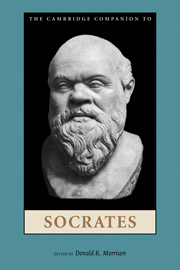Book contents
- Frontmatter
- 1 The Rise and Fall of the Socratic Problem
- 2 The Students of Socrates
- 3 Xenophon and the Enviable Life of Socrates
- 4 Socrates in Aristophanes’ Clouds
- 5 Socrates and the New Learning
- 6 Socratic Religion
- 7 Socrates and Democratic Athens
- 8 Socratic Method
- 9 Self-Examination
- 10 Socratic Ignorance
- 11 Reconsidering Socratic Irony
- 12 Socratic Ethics and the Socratic Psychology of Action
- 13 Socrates and Eudaimonia
- 14 Socrates’ Political Philosophy
- 15 Socrates in Later Greek Philosophy
- Socrates Bibliography
- Index of Names and Subjects
- Index of Passages
11 - Reconsidering Socratic Irony
Published online by Cambridge University Press: 28 March 2011
- Frontmatter
- 1 The Rise and Fall of the Socratic Problem
- 2 The Students of Socrates
- 3 Xenophon and the Enviable Life of Socrates
- 4 Socrates in Aristophanes’ Clouds
- 5 Socrates and the New Learning
- 6 Socratic Religion
- 7 Socrates and Democratic Athens
- 8 Socratic Method
- 9 Self-Examination
- 10 Socratic Ignorance
- 11 Reconsidering Socratic Irony
- 12 Socratic Ethics and the Socratic Psychology of Action
- 13 Socrates and Eudaimonia
- 14 Socrates’ Political Philosophy
- 15 Socrates in Later Greek Philosophy
- Socrates Bibliography
- Index of Names and Subjects
- Index of Passages
Summary
introduction
On his way to court, as a defendant against the charges – of not worshipping the city’s gods; introducing new gods; and corrupting the youth – which will lead to his conviction and execution, Socrates meets his officious Athenian compatriot Euthyphro. Euthyphro is bringing a prosecution of his own father for murder, an action that most Athenians would regard with horror as violating the divine obligation of filial piety. To Euthyphro’s boast that he has knowledge of the divine, and of piety and impiety, Socrates replies: “It is indeed most important, my admirable Euthyphro, that I should become your pupil, and as regards this indictment challenge Meletus [one of the three citizen-prosecutors of Socrates] … and say to him … that … I have become your pupil.” (Euphr. 5a-b)
You may find it hard to believe that Socrates is sincere in his admiring desire to become Euthyphro’s pupil. This is a prime instance of the Socratic speeches in Plato’s dialogues which many readers have found it necessary, or desirable, to interpret as spoken ironically: in this case, implying that the smug Euthyphro actually has nothing to teach Socrates. For ‘irony’ is, in a representative definition, “saying something with the intent that the message is understood as conveying the opposite or an otherwise different meaning” – although we must immediately ask, understood by whom? Sometimes, by an addressee who is expected to understand the irony, in which case irony can be a graceful and playful way of conveying meaning.
- Type
- Chapter
- Information
- The Cambridge Companion to Socrates , pp. 237 - 259Publisher: Cambridge University PressPrint publication year: 2010
- 7
- Cited by

